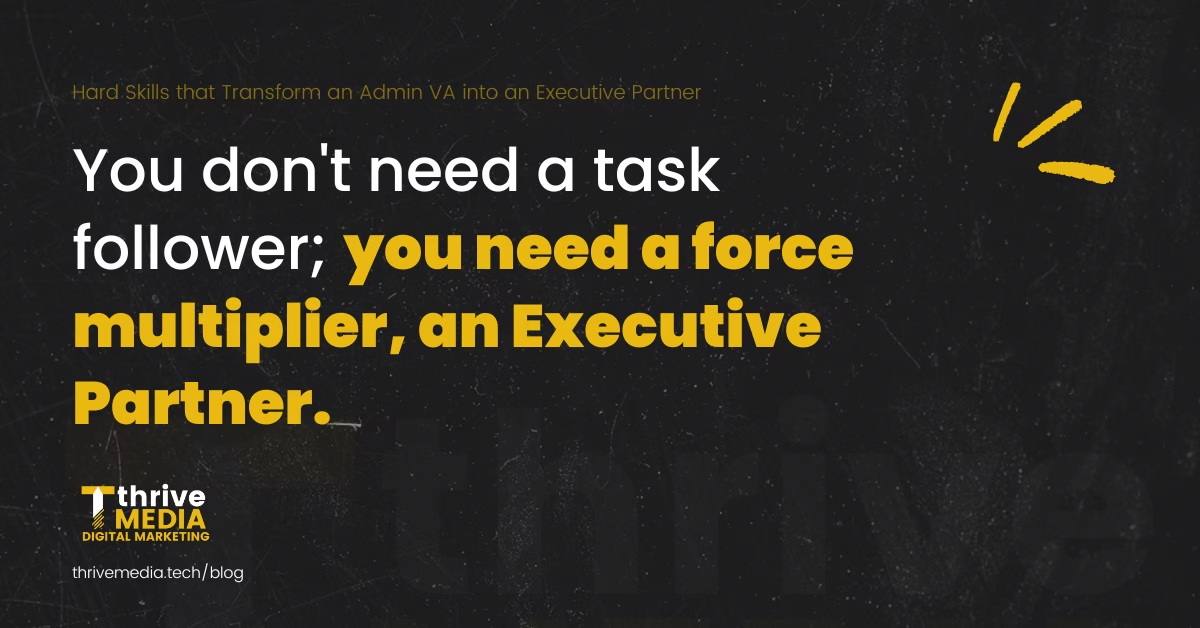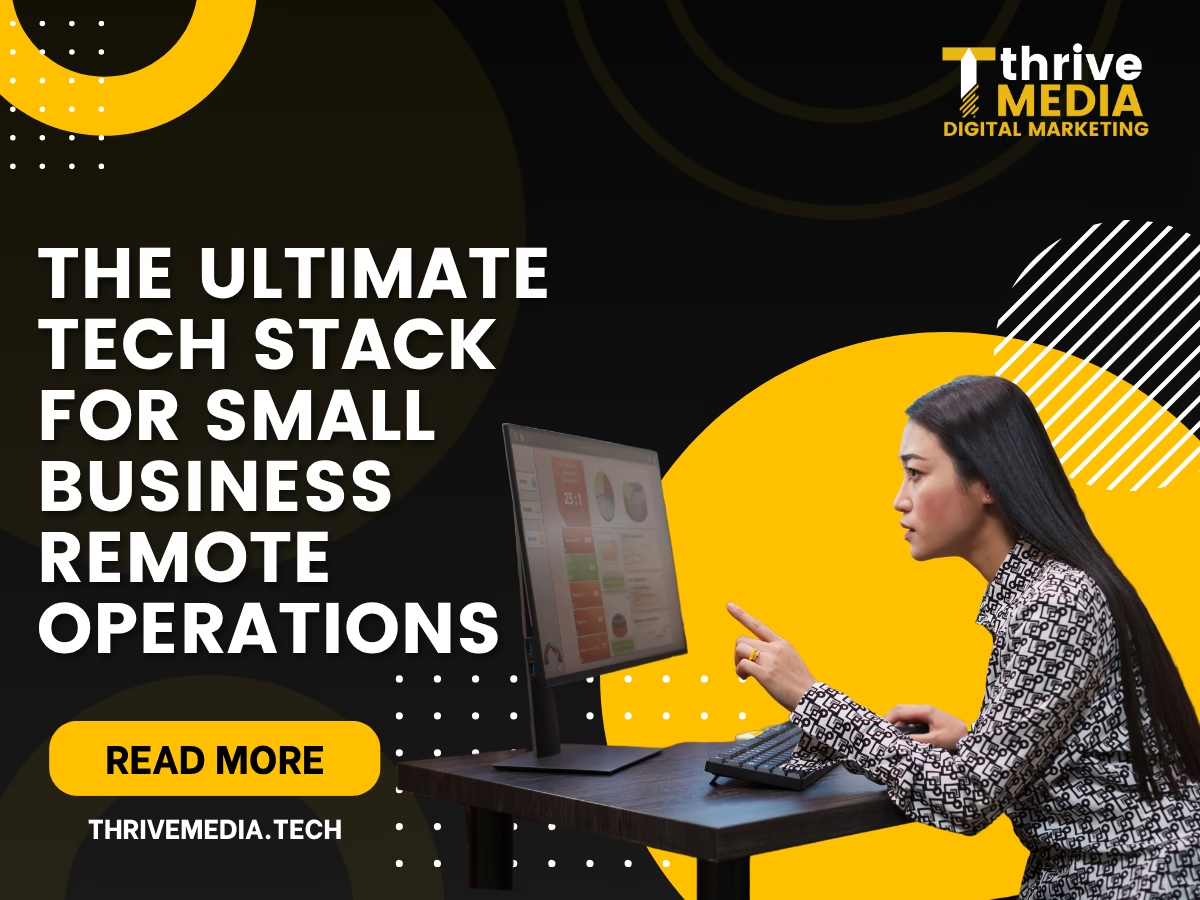The Cost of Doing It Yourself
Let’s be honest: your time is the most expensive resource in your company. When you spend two hours compiling a financial report or troubleshooting a CRM sync, you aren’t managing; you’re executing tasks that actively prevent you from performing your high-level, executive functions.
The typical reaction is to search for an Admin VA. But most businesses end up hiring someone who simply replicates their own task list, someone who manages your inbox but requires supervision to do it. That’s a transactional arrangement.
Your business needs a paradigm shift. You don’t need a task follower; you need a force multiplier, an Executive Partner. This elevation isn’t achieved through soft skills alone; it demands specific, demonstrable hard skills that provide leverage.

This transformation from a supportive individual contributor to a genuine executive-level co-pilot is not rooted in personality or soft skills like communication, though those are non-negotiable table stakes. It’s driven by a mastery of measurable, repeatable, high-leverage hard skills.
These are the competencies that allow a team member to stop asking how to do a task and start determining why a task should be done, and what outcome it will yield.
To bridge this operational gulf, an assistant must commit to mastering the following measurable skills. They must move beyond maintenance and into mastery, armed with tools and frameworks that directly impact your bottom line.
The Executive Partner Checklist: Measurable Skills that Matter
The following hard skills are non-negotiable for transforming a traditional administrative assistant into a true Executive Partner. These are the proficiencies that directly impact your bottom line and reclaim your executive hours.
1. Financial Systems Command
The old-school Admin VA inputs receipts. The Executive Partner VA commands your financial systems.
What to look for:
- Light Analytics Proficiency: Ability to work within platforms like QuickBooks or Xero to generate not just balance sheets, but cash flow forecasts and spend reports that highlight outliers.
- Invoicing & Reconciliation Mastery: Managing the entire accounts receivable/payable lifecycle, ensuring compliance, and performing accurate, timely bank and ledger reconciliations.
- Budget Oversight: Tracking expenses against pre-set departmental budgets, flagging potential overruns before they become problems.
The Leverage Point: This skill set turns your VA into an effective financial gatekeeper, ensuring your money is tracked, understood, and proactively managed.
2. Process Architecture & SOP Design
You have a unique way of doing things. If that process lives only in your head, it’s not a business system—it’s a dependency.
What to look for:
- Systems Thinking: The ability to take a complex, multi-step operation (like client onboarding or content approval) and break it down into a sequence of repeatable, measurable steps.
- Standard Operating Procedure (SOP) Creation: Drafting clear, concise documentation (using tools like Notion, Loom, or internal wikis) that anyone can follow.
- Continuous Improvement: A relentless focus on optimizing those SOPs, constantly reducing friction and waste in your operations.
The Leverage Point: An Admin VA who designs your SOPs is building the operational blueprint for scaling your business.

3. Automation and Tech Stack Integration
Every time a team member manually transfers data between two apps, your business loses time and introduces risk.
What to look for:
- CRM/CMS Proficiency: Deep familiarity with common platforms (Salesforce, HubSpot, WordPress, etc.) beyond basic data entry, including user management and reporting functions.
- Workflow Automation Setup: Hands-on experience using tools like Zapier, IFTTT, or native platform automations to connect disparate tools and eliminate manual, repetitive tasks.
- Data Integrity Management: Proactively auditing data entry processes to ensure clean, reliable information across all systems—the foundation of all good decision-making.
The Leverage Point: They automate the repetitive, allowing your internal team to focus solely on high-value interactions.
4. High-Impact Communication
Your administrative partner is often the first and last point of contact for external stakeholders. Their communication must be professional, articulate, and strategic.
What to look for:
- Editorial Fluency: The ability to draft and edit professional documents (proposals, investor updates, executive summaries) that require minimal revision from you.
- Meeting Command: The hard skill of running a tight, efficient meeting—distributing pre-read materials, steering the conversation to the agenda, and producing a succinct list of immediate, assigned action items.
- Information Governance: Structuring cloud drives, shared folders, and internal wikis so that critical information is always accessible, never buried.
The Leverage Point: You gain confidence that every external touchpoint reflects the polished, professional image of your company.

The Next Step: Building Your Executive Team
The transformation from an Administrative VA to a true Executive Partner is a strategic investment, not merely a salary increase. The cost of settling for a supportive team member who can only react to tasks is the most significant opportunity cost in business.
Every hour you spend clarifying a financial report, double-checking a system automation, or outlining a project plan that should have been managed autonomously, is an hour taken directly from high-level vision, funding acquisition, or market positioning.
The reality is that this caliber of talent, the individual who arrives with financial literacy, system architecture skills, and a strategic, data-driven mindset, is rare. They are cultivated through rigorous vetting, specialized training, and a focus on producing tangible, measurable results for high-growth firms.
Your next chapter of scaling demands more than just capable hands; it demands a co-pilot who has mastered the hard skills of executive ownership. It demands a partner ready to absorb complexity and drive measurable impact, freeing you to focus exclusively on the next great horizon for your company. The goal isn’t just to be busy; the goal is to thrive.











